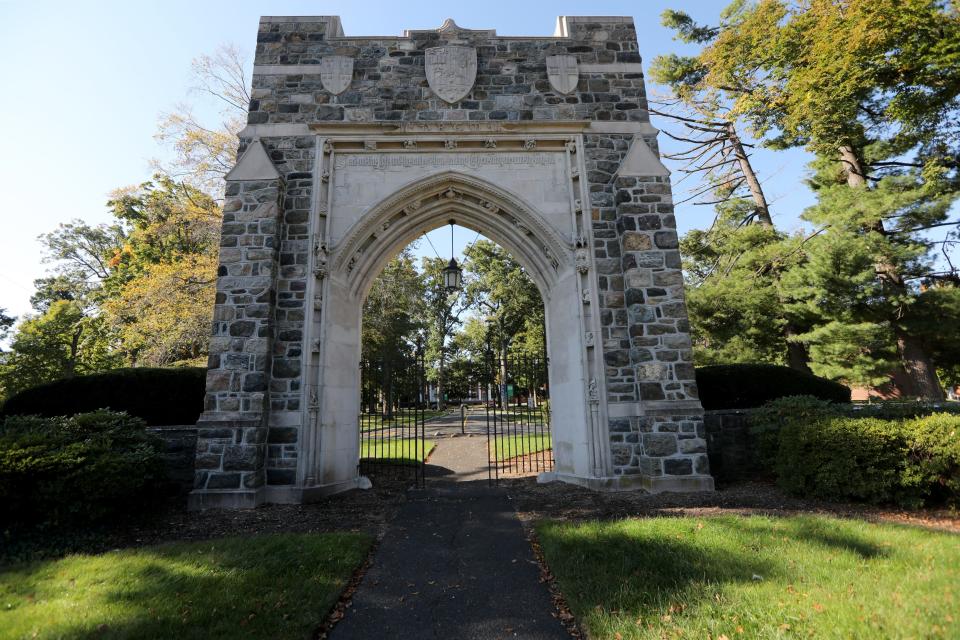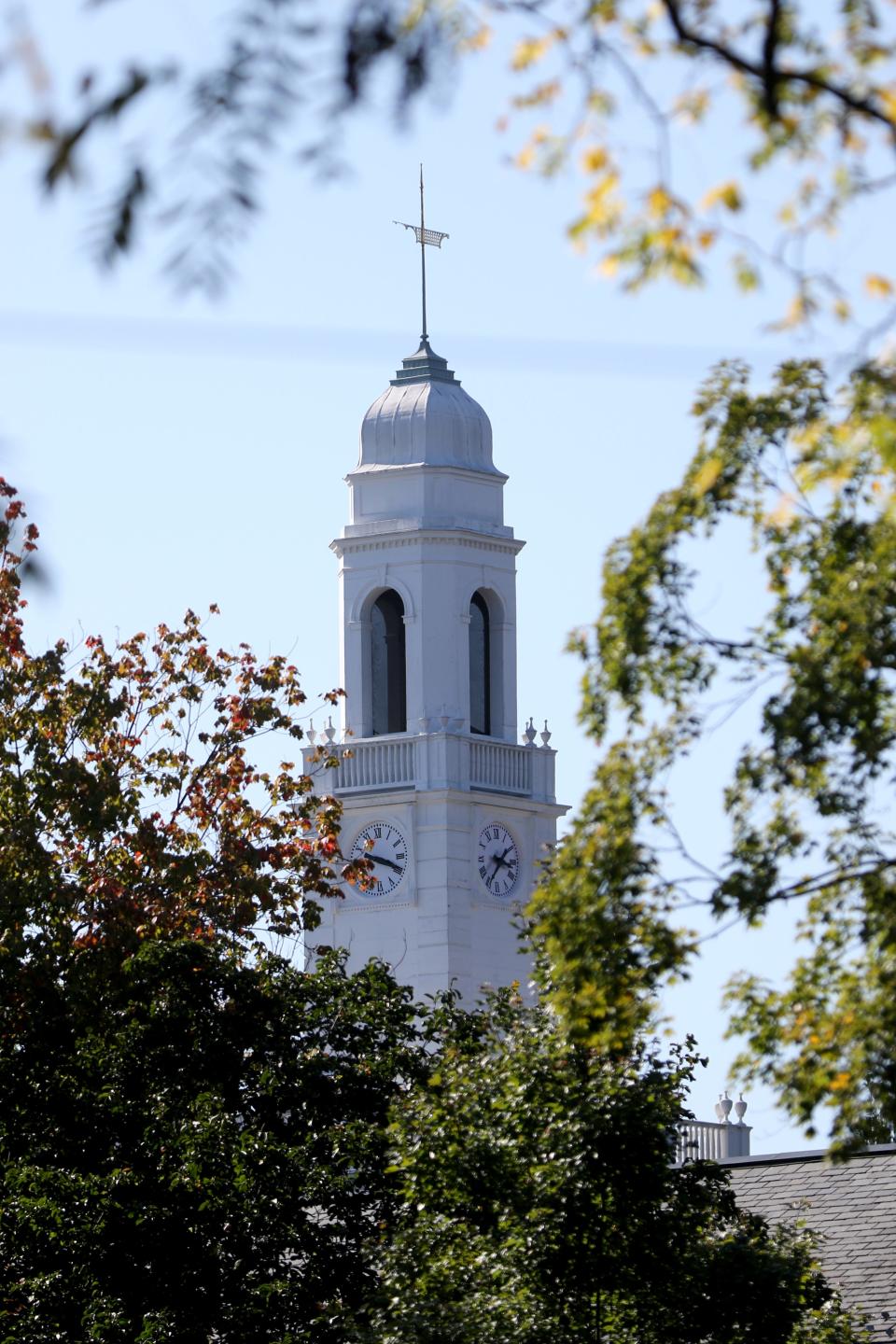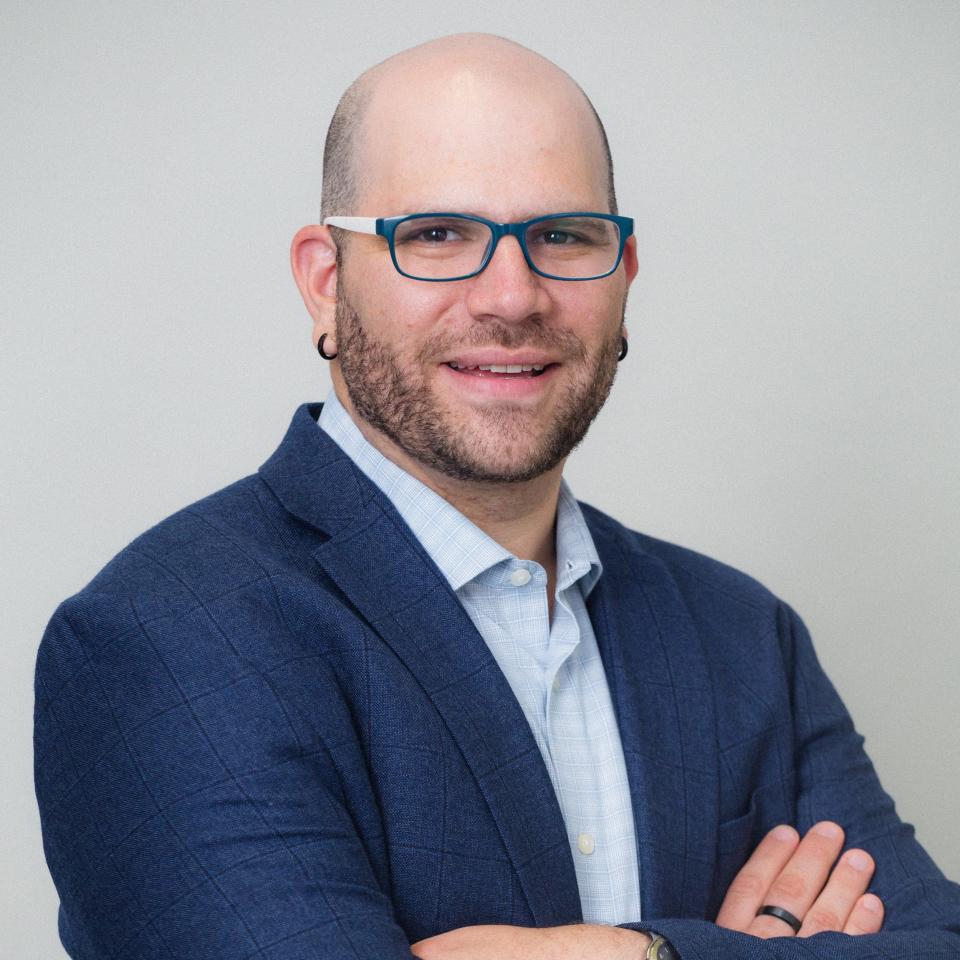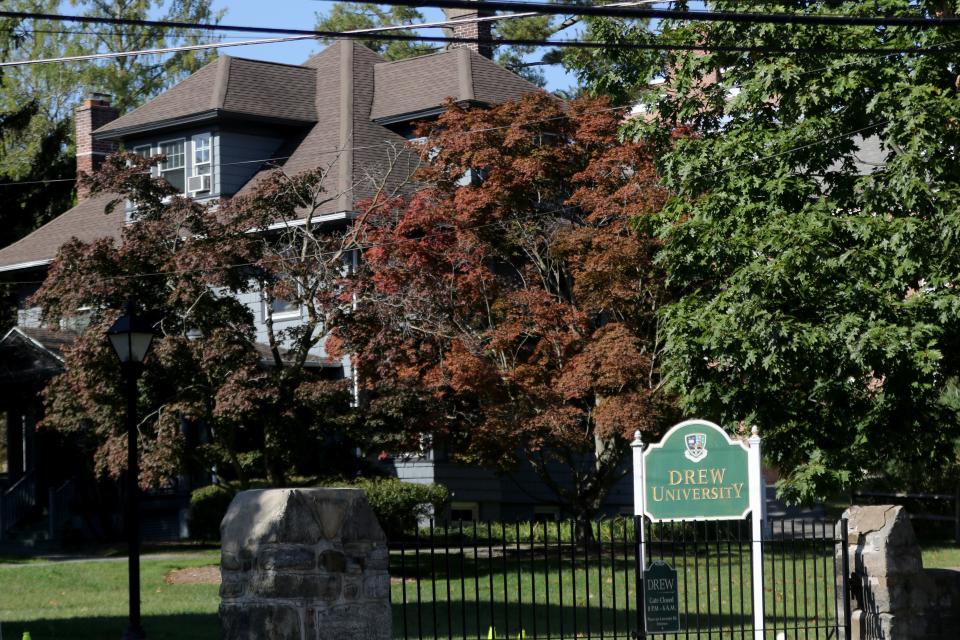After Israeli hostage posters disappear at Drew University, Jewish students on edge
After posters depicting Israelis held hostage by Hamas were allegedly ripped down on Drew University's Madison campus recently, some Jewish students say inaction by the university — and divisive social media posts from a pro-Palestinian campus group — have left them fearing for their safety.
Instagram posts by the pro-Palestinian campus group Students for Justice in Palestine that allude to violence made many Jewish students feel targeted, after the posters on the campus Jewish Hillel center were torn down, students said.
The controversy comes amid congressional and Education Department investigations into alleged antisemitism and Islamophobia at more than a dozen universities — including Rutgers, Harvard, Stanford and Columbia — as the line between hateful speech and free speech has become increasingly blurred on college campuses.

Elizabeth Magill, president of the University of Pennsylvania, resigned Saturday after she and two other university presidents were criticized for not unequivocally describing calls for the genocide of Jews as an act of harassment during a hearing in Congress.
And Rutgers — now under investigation by the federal Department of Education over issues of antisemitism — has suspended its campus chapter of Students for Justice in Palestine.
Israel’s bombardment of Gaza — in retaliation for a Hamas attack on Israel in October that left 1,200 dead and others held hostages — has sparked campus protests in the U.S. With more than 18,600 Gazans now dead from Israeli bombardment according to the Palestinian health ministry, Israel is under mounting international pressure to stop its retaliatory attacks.
Students for Justice in Palestine social media posts
Students for Justice in Palestine is a national group that has endorsed Hamas' actions with what the Anti-Defamation League calls radical messages. In a widely circulated ‘toolkit,’ SJP described the October attacks against Israel as a “surprise operation against the Zionist enemy” by resistance members.
Instagram posts by Drew’s Students for Justice in Palestine chapter featured a sketch of a hang glider on the organization’s National Day of Resistance, observed nationwide by SJP campus chapters on Oct. 12.
Story continues below photo gallery.
The image “specifically glorifies the success of the massacre, most notably of youth at a music festival,” said Nicole Cook, the mother of a Jewish student at Drew. Hamas attackers used motorbikes and hang gliders to enter a field in southern Israel at the Nova music festival, leaving hundreds of festival attendees dead.
Another post by the Drew SJP chapter that includes the words “Shut It Down” featured a bloodstain in the shape of the map of Israel. Cook said the image appears threatening to anyone who could be linked to Israel, not just Jews.
“You only need one radical person to look at this post to go do something violent," Cook said.
More: Rutgers suspends Students for Justice in Palestine chapter, citing disruptions on campus
More: The Israel-Hamas war tears at Teaneck's inclusive tradition. Can it be fixed? | Kelly
Most worrying to some Jews on campus is a Drew SJP Instagram post saying Israelis held hostage by Hamas “are not innocent civilians,” because “the majority of those captured are either currently serving or have served or will serve in the IDF,” referring to Israel’s mandatory military service policy. All Israelis therefore “are either implicitly or explicitly involved in the aggression against the Palestinian people,” it said.
The Drew SJP chapter’s claim about the Israeli hostages was "inaccurate," said a Rutgers law school professor and Middle East studies expert.
Though Israel confirmed that some active-duty soldiers were captured on Oct. 7 by Hamas, “many of the hostages were civilians kidnapped in violation of the laws of war,” said Sahar Aziz, a law professor and Middle East studies scholar at Rutgers-Newark.
“Regardless of whether they used to be in the military or not, they're not prisoners of war under international law,” Aziz said.

The Drew administration has sent out emails condemning hateful rhetoric, Frank Merckx, Drew's vice president of enrollment management and campus life, told NorthJersey.com.
But Drew has not acknowledged concerns about disinformation or called out inciteful social media content, said a group of parents and students who have been pressing the university.
The SJP chapter at Drew did not respond to requests for comment.
Merckx and Drew’s SJP faculty adviser did not let NorthJersey.com ask student SJP members questions about their social media posts at a webinar celebrating Palestinian activism on the Drew campus this month. They cited a private university’s privilege to restrict access to students.
The 'Kidnapped' posters
SJP’s prominence on campus as a vocal political group attracted attention and won many followers after the war broke out, said Drew senior Sarah Szuchman.
Then, in late October, posters titled "Kidnapped" showing photographs of hostages held by Hamas were torn off the Hillel center and other campus buildings.
Szuchman said she was “devastated” by the vandalism. In an email Szuchman shared with NorthJersey.com, Hillel faculty adviser Sharyn Colon apologized for the vandalism, telling Hillel students that “for the first time” she was uncomfortable as a Jew on campus. Colon did not respond to requests for comment.

“What saddens me the most is that I have heard from many Jewish students that they do not feel safe on our campus," Colon wrote in the email.
Drew's SJP chapter had criticized the "Kidnapped" posters in a series of Instagram posts and demanded an apology from the university for letting them be posted. The posters “threatened the livelihoods of Palestinians” and dehumanized them, SJP said on Instagram.
Students and parents sent emails complaining that the posters had been torn down and asking for a conversation with administrators. During a video Zoom meeting organized by a student who posted the fliers, two administrators — Merckx and Michelle Brisson, the dean of student life — questioned her.
On Zoom, Merckx allegedly said the "Kidnapped" posters could be emotionally triggering for other students. Was Hamas really a terrorist group, Brisson allegedly asked the student at the meeting. Brisson later told the student she “misspoke,” the student said.
The university did not respond to a request for comment on the exchange, citing student privacy. It also said its investigation into the vandalism was inconclusive.
Campus security cameras found “no instances of removal,” and therefore “we are not able to assess or comment on the nature or the intention behind any removal,” Merckx told NorthJersey.com in a statement.
“To claim that the hostages abducted on October 7 don’t count as civilians being taken because some of them also have served in the army is simply monstrous,” said Rabbi Ron Fish, a director of antisemitism advocacy and education for the Anti-Defamation League.
“The elderly, the infants and children, the civilians of many nationalities, and the complete innocence of all the captives is a central point of intense grief and fear among Jews everywhere," Fish said. "And it is a fact. Those who would claim otherwise are engaging in the spreading of lies.”
Universities must call out disinformation, he said, to serve educational goals.
The Drew SJP chapter's social media statements need to be viewed in the context of current events, said Aziz, the Rutgers-Newark professor. They are coming as many students on university campuses feel a sense “of siege as Muslims or Arabs or Palestinian students,” because comments against Israel's continued bombing of Gaza are being taken as antisemitic, Aziz said.
“Conflating a defense of Palestinian human rights with antisemitism, again, is incorrect,” she said. “There doesn't seem to be an equal recognition of the Palestinian, Muslim and Arab students' perspectives and experiences” to that of Jewish students, Aziz said.
Universities have leeway to condemn or clarify speech
Punishing students for offensive content goes against free speech, said Jonathan Friedman of PEN America, which advocates for free speech and free expression.
But "universities have a lot of leeway to use their own voice to condemn certain speech, to try to clarify certain speech or to speak in their own voice,” he said, noting that private universities such as Drew can create their own First Amendment policies.

The campus student handbook is on a private network after a recent revamp, a spokesperson said, though links to some policies are public. The university's social media policy gives it the right to remove any content on its accounts, including content deemed threatening. Some other links, including the Bias Response Hotline and Human Rights Complaints, are broken.
“I wouldn't be in favor of punishing the students who are accused of putting up falsehoods,” Friedman said, but “there are clear cases where speech crosses the line."
"If properly investigated and documented, yes, universities should be holding students accountable,” he said.
Drew goes to great extents “to make sure nobody feels excluded, nobody feels disengaged and everybody feels welcomed," said Cook, the parent of a Jewish student. "The problem is the double standard."
"I have no problem if students are out there calling for boycotts and calling for government action. All that’s OK. This is America," she said. "But comments and posts that call for the elimination of a country — Israel — is so hurtful, and there is no recognition even of that.”
Hillel students lost access to Instagram account
About the time the "Kidnapped" posters disappeared, Hillel students at Drew lost access to the group’s Instagram account, one student said. Students were blocked from tagging, sharing or commenting on the handle. A pro-Israel post was taken down. A few days after an inquiry by NorthJersey.com, the account became public again, but students did not get back their login access.
The issue was a “glitch” caused by a student using a cellphone to log in to the account, the university said. But a dean had also expressed unhappiness about pro-Israel posts to Colon, the Hillel adviser, said Jewish students familiar with the situation.
Some of those students and parents say they do not believe the university’s claim about the glitch, especially since SJP’s Instagram account remained active.

The Hillel Instagram account going private "without any commentary whatsoever, without any clarity about why,” is troubling, said Friedman, of PEN America. “That kind of lack of transparency can be itself a concern, because it undermines faith in the university to uphold free expression consistently for everybody.”
Jewish students on the small, 1,600-student campus have taken to leaving during SJP events and rallies. For Szuchman, her off-campus apartment is a getaway.
“The apartment has saved me," she said. "Before the war, there were no issues like this. The school is very liberal."
"The student body is very opinionated and there's lots of advocacy for all sorts of things like race, gender and sexuality," she said. "So when all this happened, I thought there would be some support for the Jewish students. But it's been the opposite.”
This article originally appeared on NorthJersey.com: Vandalism and fear cut morale for some Jews at Drew University

